Today is the second day of the TWELVE days of Christmas, leading up to Epiphany, which is a celebration of the day that Jesus was made manifest to the gentiles, ie the Wise Men.
Here's an Orthodox Christian icon of the Epiphany:

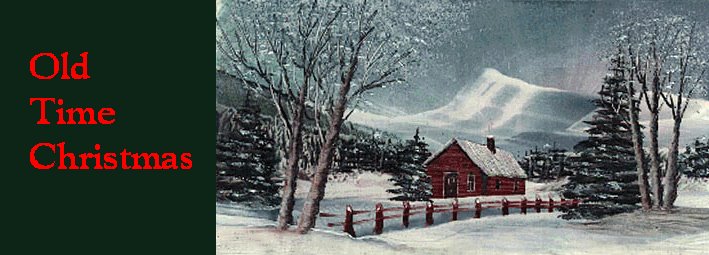

 In the corner furthest from the window Jeremy looked through, there was a table just like the one under his nose. And to the right of it, just as in his own house, there was the kitchen! And far behind the little gingerbread table stood the Christmas tree, in front of a small, crackling fire. And the voices of his parents were clearly audible from two tiny figures standing in front of the tree. They were talking about their children.
In the corner furthest from the window Jeremy looked through, there was a table just like the one under his nose. And to the right of it, just as in his own house, there was the kitchen! And far behind the little gingerbread table stood the Christmas tree, in front of a small, crackling fire. And the voices of his parents were clearly audible from two tiny figures standing in front of the tree. They were talking about their children.
 The term Yuletide came to be synonymous with the Christmas season because of the tradition of burning the Yule log. At the beginning of the holiday season, a large block of oak was cut and hauled into the house. This Yule log would then form the foundation for all fires throughout the holiday season.
The term Yuletide came to be synonymous with the Christmas season because of the tradition of burning the Yule log. At the beginning of the holiday season, a large block of oak was cut and hauled into the house. This Yule log would then form the foundation for all fires throughout the holiday season.
'Twas the night before Christmas, when all through the house
Not a creature was stirring, not even a mouse;

The stockings were hung by the chimney with care,
In hopes that St. Nicholas soon would be there; The children were nestled all snug in their beds,
The children were nestled all snug in their beds,
While visions of sugar-plums danced in their heads;
And mamma in her 'kerchief, and I in my cap,
Had just settled down for a long winter's nap,
When out on the lawn there arose such a clatter,
I sprang from the bed to see what was the matter.
Away to the window I flew like a flash,
Tore open the shutters and threw up the sash.
The moon on the breast of the new-fallen snow
Gave the lustre of mid-day to objects below,
When, what to my wondering eyes should appear, But a miniature sleigh, and eight tiny reindeer,
But a miniature sleigh, and eight tiny reindeer,
With a little old driver, so lively and quick,
I knew in a moment it must be St. Nick.
More rapid than eagles his coursers they came,
And he whistled, and shouted, and called them by name;
"Now, Dasher! now, Dancer! now, Prancer and Vixen!
On, Comet! on Cupid! on, Donder and Blitzen!
To the top of the porch! to the top of the wall!
Now dash away! dash away! dash away all!"
As dry leaves that before the wild hurricane fly,
When they meet with an obstacle, mount to the sky,
So up to the house-top the coursers they flew,
With the sleigh full of toys, and St. Nicholas too.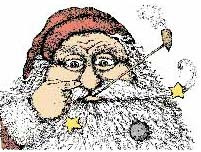 And then, in a twinkling, I heard on the roof
And then, in a twinkling, I heard on the roof
The prancing and pawing of each little hoof.
As I drew in my hand, and was turning around,
Down the chimney St. Nicholas came with a bound.
He was dressed all in fur, from his head to his foot,
And his clothes were all tarnished with ashes and soot;
A bundle of toys he had flung on his back,
And he looked like a peddler just opening his pack.
His eyes -- how they twinkled! his dimples how merry!
His cheeks were like roses, his nose like a cherry!
His droll little mouth was drawn up like a bow,
And the beard of his chin was as white as the snow;
The stump of a pipe he held tight in his teeth,
And the smoke it encircled his head like a wreath;
He had a broad face and a little round belly,
That shook, when he laughed like a bowlful of jelly.
He was chubby and plump, a right jolly old elf,
And I laughed when I saw him, in spite of myself;
A wink of his eye and a twist of his head,
Soon gave me to know I had nothing to dread;
He spoke not a word, but went straight to his work,
And filled all the stockings; then turned with a jerk,
And laying his finger aside of his nose,
And giving a nod, up the chimney he rose;
He sprang to his sleigh, to his team gave a whistle,
And away they all flew like the down of a thistle. But I heard him exclaim, ere he drove out of sight,
But I heard him exclaim, ere he drove out of sight,
"Happy Christmas to all, and to all a good-night."
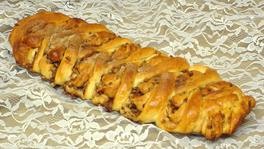 Every year around Christmas time, my grandmother would get out the ingredients to bake the traditional Swedish Christmas bread.
Every year around Christmas time, my grandmother would get out the ingredients to bake the traditional Swedish Christmas bread.Topping:
HEAT MILK, WATER, and margarine until very warm. Mix about one-third of the flour with the other dry ingredients and beat into liquid. Add 2 eggs and beat. Add more flour until dough can be kneaded. Knead and place in buttered bowl to rise until doubled, about 1 hour. Punch down, divide in half, then divide each half in thirds and make 2 braids.
Place on a greased cookie sheet and cover in warm place until doubled, 30 to 45 minutes. Preheat oven to 350º F. Brush dough with beaten egg. Sprinkle with sugar and almonds. Bake for about 20 minutes.
Make this traditional Swedish Christmas treat your own, and enjoy!
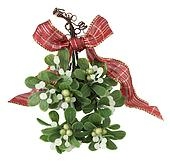 Mistletoe was especially dear to Bacchus, who benefited from its magical protective properties. As Bacchus came to represent drinking and merrymaking, and less chaos and "bacchic frenzy," so too did mistletoe weave its way into Western consciousness as symbolic of "letting the good times roll."
Mistletoe was especially dear to Bacchus, who benefited from its magical protective properties. As Bacchus came to represent drinking and merrymaking, and less chaos and "bacchic frenzy," so too did mistletoe weave its way into Western consciousness as symbolic of "letting the good times roll."Not many those mornings trod the piling streets: an old man always, fawn-bowlered,
yellow-gloved and, at this time of year, with spats of snow, would take
his constitutional to the white bowling green and back, as he would take
it wet or fire on Christmas Day or Doomsday; sometimes two hale young men,
with big pipes blazing, no overcoats and wind blown scarfs, would trudge,
unspeaking, down to the forlorn sea, to work up an appetite, to blow away
the fumes, who knows, to walk into the waves until nothing of them was left
but the two furling smoke clouds of their inextinguishable briars. Then
I would be slap-dashing home, the gravy smell of the dinners of others,
the bird smell, the brandy, the pudding and mince, coiling up to my nostrils,
when out of a snow-clogged side lane would come a boy the spit of myself,
with a pink-tipped cigarette and the violet past of a black eye, cocky as
a bullfinch, leering all to himself.
I hated him on sight and sound, and would be about to put my dog whistle
to my lips and blow him off the face of Christmas when suddenly he, with
a violet wink, put his whistle to his lips and blew so stridently, so high,
so exquisitely loud, that gobbling faces, their cheeks bulged with goose,
would press against their tinsled windows, the whole length of the white
echoing street. For dinner we had turkey and blazing pudding, and after
dinner the Uncles sat in front of the fire, loosened all buttons, put their
large moist hands over their watch chains, groaned a little and slept. Mothers,
aunts and sisters scuttled to and fro, bearing tureens. Auntie Bessie, who
had already been frightened, twice, by a clock-work mouse, whimpered at
the sideboard and had some elderberry wine. The dog was sick. Auntie Dosie
had to have three aspirins, but Auntie Hannah, who liked port, stood in
the middle of the snowbound back yard, singing like a big-bosomed thrush.
I would blow up balloons to see how big they would blow up to; and, when
they burst, which they all did, the Uncles jumped and rumbled. In the rich
and heavy afternoon, the Uncles breathing like dolphins and the snow descending,
I would sit among festoons and Chinese lanterns and nibble dates and try
to make a model man-o'-war, following the Instructions for Little Engineers,
and produce what might be mistaken for a sea-going tramcar.
Or I would go out, my bright new boots squeaking, into the white world,
on to the seaward hill, to call on Jim and Dan and Jack and to pad through
the still streets, leaving huge footprints on the hidden pavements.
"I bet people will think there's been hippos."
"What would you do if you saw a hippo coming down our street?"
"I'd go like this, bang! I'd throw him over the railings and roll him
down the hill and then I'd tickle him under the ear and he'd wag his tail."
"What would you do if you saw two hippos?"
Iron-flanked and bellowing he-hippos clanked and battered through the scudding
snow toward us as we passed Mr. Daniel's house.
"Let's post Mr. Daniel a snow-ball through his letter box."
"Let's write things in the snow."
"Let's write, 'Mr. Daniel looks like a spaniel' all over his lawn."
Or we walked on the white shore. "Can the fishes see it's snowing?"
The silent one-clouded heavens drifted on to the sea. Now we were snow-blind
travelers lost on the north hills, and vast dewlapped dogs, with flasks
round their necks, ambled and shambled up to us, baying "Excelsior."
We returned home through the poor streets where only a few children fumbled
with bare red fingers in the wheel-rutted snow and cat-called after us,
their voices fading away, as we trudged uphill, into the cries of the dock
birds and the hooting of ships out in the whirling bay. And then, at tea
the recovered Uncles would be jolly; and the ice cake loomed in the center
of the table like a marble grave. Auntie Hannah laced her tea with rum,
because it was only once a year.
Bring out the tall tales now that we told by the fire as the gaslight bubbled
like a diver. Ghosts whooed like owls in the long nights when I dared not
look over my shoulder; animals lurked in the cubbyhole under the stairs
and the gas meter ticked. And I remember that we went singing carols once,
when there wasn't the shaving of a moon to light the flying streets. At
the end of a long road was a drive that led to a large house, and we stumbled
up the darkness of the drive that night, each one of us afraid, each one
holding a stone in his hand in case, and all of us too brave to say a word.
The wind through the trees made noises as of old and unpleasant and maybe
webfooted men wheezing in caves. We reached the black bulk of the house.
"What shall we give them? Hark the Herald?"
"No," Jack said, "Good King Wencelas. I'll count three."
One, two three, and we began to sing, our voices high and seemingly distant
in the snow-felted darkness round the house that was occupied by nobody
we knew. We stood close together, near the dark door. Good King Wencelas
looked out On the Feast of Stephen ... And then a small, dry voice, like
the voice of someone who has not spoken for a long time, joined our singing:
a small, dry, eggshell voice from the other side of the door: a small dry
voice through the keyhole. And when we stopped running we were outside our
house; the front room was lovely; balloons floated under the hot-water-bottle-gulping
gas; everything was good again and shone over the town.
"Perhaps it was a ghost," Jim said. "
Perhaps it was trolls," Dan said, who was always reading.
"Let's go in and see if there's any jelly left," Jack said. And
we did that.
Always on Christmas night there was music. An uncle played the fiddle, a
cousin sang "Cherry Ripe," and another uncle sang "Drake's
Drum." It was very warm in the little house. Auntie Hannah, who had
got on to the parsnip wine, sang a song about Bleeding Hearts and Death,
and then another in which she said her heart was like a Bird's Nest; and
then everybody laughed again; and then I went to bed. Looking through my
bedroom window, out into the moonlight and the unending smoke-colored snow,
I could see the lights in the windows of all the other houses on our hill
and hear the music rising from them up the long, steady falling night. I
turned the gas down, I got into bed. I said some words to the close and
holy darkness, and then I slept.
"Go on the Useless Presents."
"Bags of moist and many-colored jelly babies and a folded flag and
a false nose and a tram-conductor's cap and a machine that punched tickets
and rang a bell; never a catapult; once, by mistake that no one could explain,
a little hatchet; and a celluloid duck that made, when you pressed it, a
most unducklike sound, a mewing moo that an ambitious cat might make who
wished to be a cow; and a painting book in which I could make the grass,
the trees, the sea and the animals any colour I pleased, and still the dazzling
sky-blue sheep are grazing in the red field under the rainbow-billed and
pea-green birds. Hardboileds, toffee, fudge and allsorts, crunches, cracknels,
humbugs, glaciers, marzipan, and butterwelsh for the Welsh. And troops of
bright tin soldiers who, if they could not fight, could always run. And
Snakes-and-Families and Happy Ladders. And Easy Hobbi-Games for Little Engineers,
complete with instructions. Oh, easy for Leonardo! And a whistle to make
the dogs bark to wake up the old man next door to make him beat on the wall
with his stick to shake our picture off the wall. And a packet of cigarettes:
you put one in your mouth and you stood at the corner of the street and
you waited for hours, in vain, for an old lady to scold you for smoking
a cigarette, and then with a smirk you ate it. And then it was breakfast
under the balloons."
"Were there Uncles like in our house?"
"There are always Uncles at Christmas. The same Uncles. And on Christmas
morning, with dog-disturbing whistle and sugar fags, I would scour the swatched
town for the news of the little world, and find always a dead bird by the
Post Office or by the white deserted swings; perhaps a robin, all but one
of his fires out. Men and women wading or scooping back from chapel, with
taproom noses and wind-bussed cheeks, all albinos, huddles their stiff black
jarring feathers against the irreligious snow. Mistletoe hung from the gas
brackets in all the front parlors; there was sherry and walnuts and bottled
beer and crackers by the dessertspoons; and cats in their fur-abouts watched
the fires; and the high-heaped fire spat, all ready for the chestnuts and
the mulling pokers. Some few large men sat in the front parlors, without
their collars, Uncles almost certainly, trying their new cigars, holding
them out judiciously at arms' length, returning them to their mouths, coughing,
then holding them out again as though waiting for the explosion; and some
few small aunts, not wanted in the kitchen, nor anywhere else for that matter,
sat on the very edge of their chairs, poised and brittle, afraid to break,
like faded cups and saucers."
One Christmas was so much like another, in those years around the sea-town
corner now and out of all sound except the distant speaking of the voices
I sometimes hear a moment before sleep, that I can never remember whether
it snowed for six days and six nights when I was twelve or whether it snowed
for twelve days and twelve nights when I was six.
All the Christmases roll down toward the two-tongued sea, like a cold and
headlong moon bundling down the sky that was our street; and they stop at
the rim of the ice-edged fish-freezing waves, and I plunge my hands in the
snow and bring out whatever I can find. In goes my hand into that wool-white
bell-tongued ball of holidays resting at the rim of the carol-singing sea,
and out come Mrs. Prothero and the firemen.
It was on the afternoon of the Christmas Eve, and I was in Mrs. Prothero's
garden, waiting for cats, with her son Jim. It was snowing. It was always
snowing at Christmas. December, in my memory, is white as Lapland, though
there were no reindeers. But there were cats. Patient, cold and callous,
our hands wrapped in socks, we waited to snowball the cats. Sleek and long
as jaguars and horrible-whiskered, spitting and snarling, they would slink
and sidle over the white back-garden walls, and the lynx-eyed hunters, Jim
and I, fur-capped and moccasined trappers from Hudson Bay, off Mumbles Road,
would hurl our deadly snowballs at the green of their eyes. The wise cats
never appeared.
We were so still, Eskimo-footed arctic marksmen in the muffling silence
of the eternal snows - eternal, ever since Wednesday - that we never heard
Mrs. Prothero's first cry from her igloo at the bottom of the garden. Or,
if we heard it at all, it was, to us, like the far-off challenge of our
enemy and prey, the neighbor's polar cat. But soon the voice grew louder.
"Fire!" cried Mrs. Prothero, and she beat the dinner-gong.
And we ran down the garden, with the snowballs in our arms, toward the house;
and smoke, indeed, was pouring out of the dining-room, and the gong was
bombilating, and Mrs. Prothero was announcing ruin like a town crier in
Pompeii. This was better than all the cats in Wales standing on the wall
in a row. We bounded into the house, laden with snowballs, and stopped at
the open door of the smoke-filled room.
Something was burning all right; perhaps it was Mr. Prothero, who always
slept there after midday dinner with a newspaper over his face. But he was
standing in the middle of the room, saying, "A fine Christmas!"
and smacking at the smoke with a slipper.
"Call the fire brigade," cried Mrs. Prothero as she beat the gong.
"There won't be there," said Mr. Prothero, "it's Christmas."
There was no fire to be seen, only clouds of smoke and Mr. Prothero standing
in the middle of them, waving his slipper as though he were conducting.
"Do something," he said. And we threw all our snowballs into the
smoke - I think we missed Mr. Prothero - and ran out of the house to the
telephone box.
"Let's call the police as well," Jim said. "And the ambulance."
"And Ernie Jenkins, he likes fires."
But we only called the fire brigade, and soon the fire engine came and three
tall men in helmets brought a hose into the house and Mr. Prothero got out
just in time before they turned it on. Nobody could have had a noisier Christmas
Eve. And when the firemen turned off the hose and were standing in the wet,
smoky room, Jim's Aunt, Miss. Prothero, came downstairs and peered in at
them. Jim and I waited, very quietly, to hear what she would say to them.
She said the right thing, always. She looked at the three tall firemen in
their shining helmets, standing among the smoke and cinders and dissolving
snowballs, and she said, "Would you like anything to read?"


 We all know the Amish don't use electricity, automobiles, or telephones. But have you ever wondered what an Amish Christmas is like?
We all know the Amish don't use electricity, automobiles, or telephones. But have you ever wondered what an Amish Christmas is like? The word "Christmas" is a contraction of the words "Christ's mass," which comes from the Middle English "Christemasse" and the Old English "Cristes mæsse", a phrase first recorded in 1038.
The word "Christmas" is a contraction of the words "Christ's mass," which comes from the Middle English "Christemasse" and the Old English "Cristes mæsse", a phrase first recorded in 1038.

Today, however, artificial trees take the place of the real thing in many living rooms across America. There are some real advantages to fake Christmas trees, including:
That said, we here at Old Time Christmas think there are some obvious advantages to a real Christmas tree, like the authentic pine scent, the look and the ambience of a real tree, and the novelty of having a pine tree from the forest in your living room.
Plus, if you're concerned about sparing a tree from being cut down, you can rent a living Christmas tree which will then be replanted!
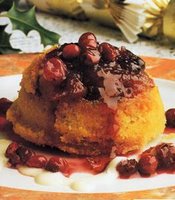 This delightful holiday tradition is an offbeat version of traditional English holiday fare. Wow your friends and family with this deliciously different treat!
This delightful holiday tradition is an offbeat version of traditional English holiday fare. Wow your friends and family with this deliciously different treat!Instructions:
Combine 6 tablespoons butter and ¾ cup sugar in a large bowl. Beat together with an electric mixer until creamy.
Add the eggs, one at a time, beating well after each addition.
Sift flour, baking powder and salt in another bowl and add half of this to the creamed mixture. Add half the milk and mix thoroughly. Add the remaining dry ingredients and the remaining milk and mix. Stir in cranberries and pecans (if omitting the pecans, add another ¼ cup cranberries).
Pour into a buttered mold (large enough to hold 6 cups). Cover tightly with foil and secure with string. Place mold on a rack in a large pot and pour enough water into pot to come halfway up the sides of the mold.
Bring water to a boil. Cover. Reduce heat to low and steam 2 hours. Remove mold from pot and let cool 10 minutes before trying to unmold. Combine remaining butter, sugar, eggnog and rum in a bowl with an electric mixer. Mix until smooth. Serve pudding drizzled with eggnog sauce.
Enjoy!


 Part I
Part IPreparation:
Part II
Ingredients:
Part Two Preparation:
 Groups of hat-and-mitten-clad singers walking house to house and singing Christmas carols by candlelight is a time honored tradition that evokes the warmest of Christmas memories.
Groups of hat-and-mitten-clad singers walking house to house and singing Christmas carols by candlelight is a time honored tradition that evokes the warmest of Christmas memories. 
 The twelve days of Christmas include the time from Christmas day on December 25th to Epiphany on January 6th.
The twelve days of Christmas include the time from Christmas day on December 25th to Epiphany on January 6th. This famous Christmas story by Charles Dickens is a holiday favorite, owing to its vivid imagery and compelling themes of greed, sin, redemption and hope.
This famous Christmas story by Charles Dickens is a holiday favorite, owing to its vivid imagery and compelling themes of greed, sin, redemption and hope.